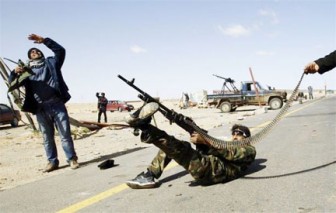RAS LANUF, Libya (Reuters) Britain and France said they were seeking UN authorisation for a no-fly zone over Libya, as Muammar Gaddafi’s warplanes counter-attacked against rebels and aid officials said a million people were in need.
Al Jazeera television said rebels had rejected an offer by Gaddafi to hold a meeting of parliament to work out a deal under which he would step down.
With civilians surrounded by forces loyal to Gaddafi in two western towns, Misrata and Zawiyah, fears grew of a rising humanitarian crisis if the fighting continued.

UN aid coordinator Valerie Amos said more than a million people fleeing or inside the country needed humanitarian aid.
“Humanitarian organisations need urgent access now,” she said. “People are injured and dying and need help immediately.”
The UN appealed for $160 million to fund an operation over the next three months to get shelter, food and medicines ready.
“We are working closely with partners on a contingency basis on elements of a resolution on a no-fly zone, making clear the need for regional support, a clear trigger for such a resolution and an appropriate legal basis,” British Foreign Secretary William Hague said yesterday.
A French source said France was “working with our partners in New York on a no-fly zone resolution”. Gulf states called for a no-fly zone and an urgent Arab League meeting.
US Defense Secretary Robert Gates, in Afghanistan where foreign forces have struggled for a decade, warned action should be taken only with international backing. The White House said all options were on the table, including arming rebels.
Russia, a permanent member of the UN Security Council with veto powers, said it opposed foreign military intervention.
NATO Secretary-General Anders Fogh Rasmussen stressed the need for UN authorisation. “I can’t imagine the international community and the United Nations would stand idly by if Gaddafi and his regime continue to attack their own people,” he said.
“We have asked our military to conduct all necessary planning so that we stand ready at short notice,” he added.
NATO has launched 24-hour surveillance of Libya with AWACS reconnaissance aircraft, the US ambassador to NATO said.
Ivo Daalder added NATO representatives were discussing other possible moves ahead of a meeting of NATO ministers on Thursday.
Western leaders, however, are anxious to avoid another drawn-out military commitment after the Iraq and Afghan wars.
President Barack Obama said he wanted to “send a very clear message to the Libyan people that we will stand with them in the face of unwarranted violence and the continuing suppression of democratic ideals”.
In the rebel-held city of Misrata, the wounded were being treated on hospital floors because of a catastrophic shortage of medical facilities in the besieged city, a resident said.
Misrata is the biggest city in the west not under the control of Gaddafi, and its stand against a militia commanded by his own son has turned it into a symbol of defiance.
Zawiyah, just 50 km (30 miles) from Tripoli, remained in rebel hands despite a push by government forces into the town, according to a Sky television report. It showed wounded fighters and civilians in Zawiya’s hospital, including a 10-year-old boy reportedly shot on his doorstep by government troops.
In the east, warplanes launched air strikes on the rebel-held oil terminal town of Ras Lanuf 600 km (400 miles) east of the capital Tripoli, witnesses said. One ripped through a car carrying a family.
The fighting has been erratic, with small groups engaging each other, guerrilla-style, in hit and run raids. Air attacks have been fitful and bombing often inaccurate.
The resilience of Gaddafi’s troops and their ability to counter-attack has raised the prospect of prolonged bloodshed.





